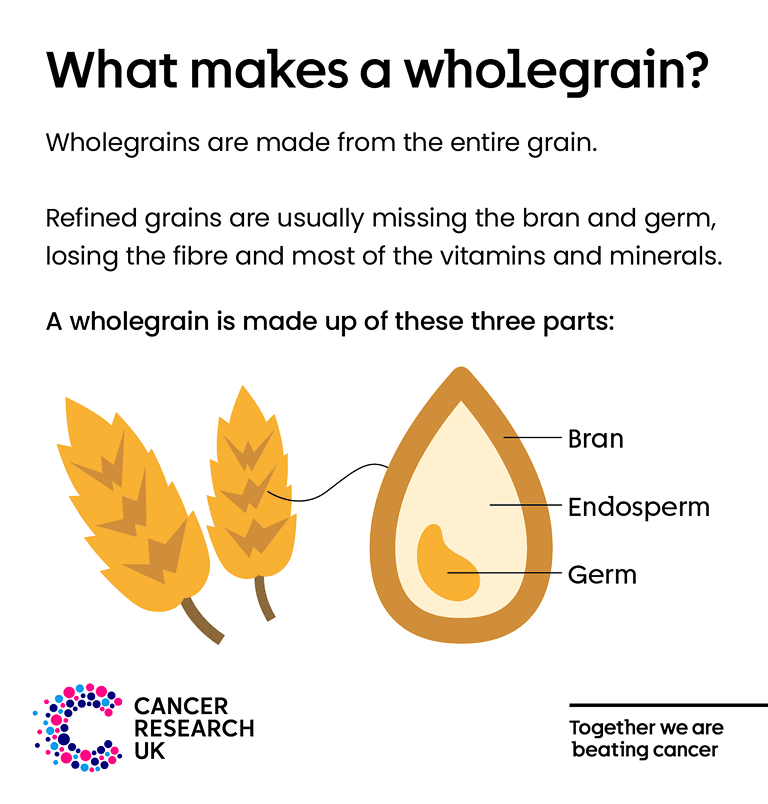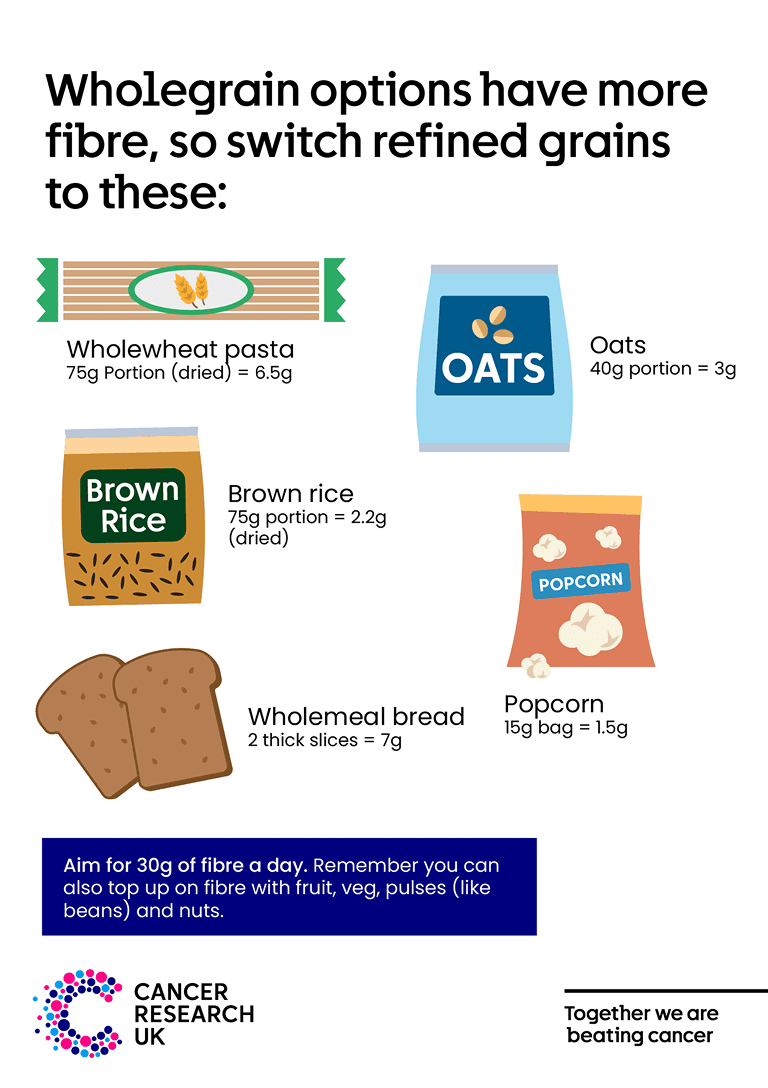Diet and cancer
Grains are the seeds of cereal plants like wheat and corn.
Wholegrains and wholegrain products are foods made from the entire grain. They are naturally full of fibre and other nutrients. Wholegrains are things like wholewheat pasta, oats, wholemeal bread, brown rice and wild rice.
Grains can be processed (refined) to create whiter grains used in white bread, white rice, and white pasta. Refined grains do not use all the grain. Because parts of the grain are missing, most of the fibre and nutrients are lost.
This means that wholegrains are higher in fibre and are more nutritious than refined grains.

Fibre is a type of carbohydrate. It is found in plant-based foods like wholegrains, fruit, vegetables and pulses like beans and lentils. Fibre helps to keep our digestive system healthy.
Yes, a high-fibre diet, including plenty of wholegrains, can lower the risk of bowel cancer.
Not all cases of bowel cancer can be prevented. A person's risk of cancer depends on many different things. But eating a high-fibre diet can help reduce the risk of bowel cancer.
Here’s how:
Fibre helps us to poo more often. It also increases the size of poos and dilutes the contents. This means harmful chemicals in poo spend less time in the bowel.
When fibre meets the bacteria that lives in the bowel, the bacteria make something called butyrate. Butyrate helps the cells in our bowel to stay healthy, so tumours are less likely to develop.
Eating more foods high in fibre may help you to feel fuller for longer.
For example, starting the day with a high-fibre breakfast can help you feel full and satisfied throughout the morning.
This may make it easier to keep a healthy weight. Keeping a healthy weight lowers the risk of bowel cancer and 12 other cancer types too.
Some research suggests that wholegrains may be especially good for preventing bowel cancer.
Wholegrains contain lots of fibre as well as many other essential nutrients like vitamins and minerals. This combination of nutrients, especially fibre, could be why wholegrains help reduce bowel cancer risk.
The government recommends that adults have 30g of fibre each day. Most of us don’t reach this amount. But there are lots of ways to get more fibre in our diet.
It’s important to eat a variety of high-fibre foods including wholegrains, fruits, vegetables and pulses, as part of a healthy balanced diet.
Check the labels on foods to see how much fibre is in them. Foods high in fibre have 6g or more fibre per 100g.
Some of the best high-fibre foods are:
Wholegrain cereals like oats, bran cereals, wheat biscuits and shredded wholewheat
Wholemeal bread
Wholewheat pasta
Lentils, chickpeas and other pulses
Parsnips
Peas
Broccoli
Baked potato with skin
Reduced sugar and salt baked beans
Unsalted nuts and seeds
Lots of wholegrains are also gluten-free such as brown rice, wild rice, corn and gluten-free oats. The NHS has information on eating a gluten-free diet.
People having bowel cancer treatment may need to eat a low-fibre diet. Find out more about this on our diet and bowel cancer page.
Making small swaps and changes can help you to get more fibre into your day:
Switch everyday foods such as bread, pasta, flour or rice to their wholegrain or brown alternative.
Start with a high-fibre breakfast like shredded wholewheat and bran cereals, or porridge oats.
Aim to eat fruit and vegetables every day (they can be fresh, frozen or tinned with no added sugar). Try to eat a variety of different fruit and veg.
Eat the skin of veggies like potatoes and carrots – this helps get the most fibre from your food.
Add pulses like lentils, chickpeas or beans to meals. Use them in stews, curries, salads or instead of meat in your favourite dishes.
Pick high-fibre snacks such as plain popcorn, fruit, unsalted nuts and seeds, wholewheat crackers, or vegetable sticks with hummus.
When shopping for wholegrains look for the word 'whole’, for example, 'wholewheat pasta’ or 'wholemeal bread’. Some multi-seed or brown breads aren’t wholegrain, so make sure to check the label.

Fibre supplements may be recommended by a doctor for some people with certain medical conditions. But for most people the best way to get more fibre is by making changes to our diet. Aim to eat more high-fibre foods, particularly wholegrains. The research on fibre and cancer risk is on the fibre in what we eat, not fibre supplements.
Last reviewed: 15 Apr 2025
Next review due: 15 Apr 2028
Questions about cancer? Call freephone 0808 800 40 40 from 9 to 5 - Monday to Friday. Alternatively, you can email us.